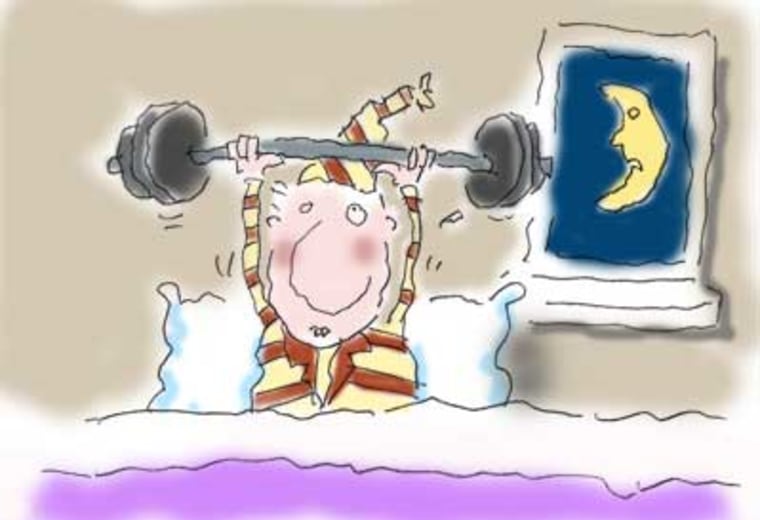Can a late-evening workout wreck a good night's sleep? And what exactly is a MET? Smart Fitness answers your queries. Have an exercise question? To send us an e-mail, click here. We’ll post select answers in future columns.
Q1: I've been dancing at night as a fun aerobic activity but was told it's bad to exercise before bedtime. Is that true?
Q2: Oftentimes after a hard workout I find it difficult to sleep well, if at all. Does exercise interfere with sleep?
A: For insomniacs and other people who have trouble getting their ZZZs, sleep specialists often recommend avoiding exercise within a few hours of bedtime. The rationale is that exercise is stimulating and raises body temperature, which can interfere with sleep.
But while there's anecdotal evidence that this may be the case — as with the reader in the second question — there's little hard science backing it, says Shawn Youngstedt, an assistant professor of exercise science at the University of South Carolina in Columbia, who studies exercise and sleep.
"It's really not substantiated by evidence," he says. "Time and time again, research has shown that people can exercise very vigorously before bedtime without it impairing sleep."
In one study that Youngstedt conducted, men who exercised as late as half an hour before bedtime experienced an elevation in body temperature but they had no trouble going to sleep. Youngstedt says the hike in body temperature may actually help because the area of the brain involved in lowering body temperature also is involved in promoting sleep.
But another study by Dr. Anne McTiernan of the Fred Hutchinson Cancer Research Center in Seattle found that women who exercised in the mornings got a better night's sleep than those who worked out in the evenings.
Morning exercise may influence circadian rhythms that affect sleep quality, she speculates, and evening exercise may cause surges in hormones like epinephrine that cause us to be more alert.
Youngstedt acknowledges there may be individual variation, and people who feel that exercise disrupts their sleep should alter their workout schedule and see if it makes a difference.
But he worries that the widespread belief that evening exercise is bad for sleep could be an "unnecessary barrier to exercise." For many busy people, the after-dinner hours may be the only time they can squeeze in fitness. "It's really the most practical time for many people to exercise," he says.
Youngstedt himself often exercises in the evenings. And, he says, "I sleep fine."
Incidentally, as experts tease out the impact of exercise on sleep, they say lack of sleep may impact your exercise routine in certain ways. For example, if you're tired, you may be more inclined to skip your workout.
"You just don't have the motivation to do it," says Hugo Rivera, a personal trainer and fitness book author in Brandon, Fla. "Your body just wants to go to bed."
He also notes that when sleep-deprived people do work out, they may not be operating at full speed.
"You're not going to be able to focus on the repetitions and exercises at hand," he says. "And your body will not be firing all the muscle fibers you need."
Experts say most people need seven to nine hours of sleep each night.
Q: What exactly is a MET? I noticed that term on the recumbent bikes at my gym.
A: A MET, or metabolic equivalent, is a way to measure the intensity of physical activity.
One MET is the energy your body uses as you sit still. The more activity you engage in, the higher the MET.
Moderate intensity activities, such as walking the dog, leisurely inline skating or biking at a modest pace, burn three to six METs, according to the Centers for Disease Control and Prevention. Vigorous activity, such as jogging, step aerobics or biking at a brisk pace, burn more than six METs.
How many METs should you burn? That depends on your goal.
If you're just trying to keep healthy, moderate activity is enough, says the CDC. If you're struggling to lose weight or training for a sporting event, you'll probably need to kick things up.
Smart Fitness now appears every other Tuesday.
